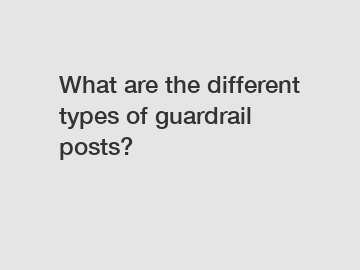Guardrail posts are an essential component of road safety infrastructure, functioning as a sturdy barrier that protects motorists and pedestrians from potential hazards. However, not all guardrails are created equal. In fact, there are several different types of guardrail posts, each designed to cater to specific needs and circumstances. In this article, we will explore the various types of guardrail posts that play a crucial role in ensuring safety on the roads.
1. Wood Guardrail Posts:
Wooden guardrail posts were frequently used in the past due to their affordability and ease of installation. They consist of timber posts embedded into the ground, supporting horizontal wooden rails. Despite their cost-effective nature, wood guardrail posts are now less prevalent due to their susceptibility to rot, weathering, and overall decreased durability. However, they may still be found on some secondary roads.

2. Steel Guardrail Posts:
Steel guardrail posts are one of the most common types of guardrail support systems found on roads worldwide. These sturdy posts are made of galvanized steel, making them resistant to rust and corrosion while offering high durability. Steel guardrail posts are usually installed at fixed intervals along the road, providing stable support for the guardrail panels. Their adaptability and longevity make them an ideal choice for both low and high-speed roadways.
3. Concrete Guardrail Posts:
Concrete guardrail posts are renowned for their exceptional strength and longevity. Constructed with reinforced concrete, they provide a reliable barrier against vehicle impact, ensuring significant road safety. These posts are often utilized on high-speed highways or roadways prone to high traffic density. Concrete guardrail posts offer optimal resistance to forces generated by collisions, reducing risks of injury and damage.
4. Composite Guardrail Posts:
In recent years, composite guardrail posts have gained popularity due to their innovative design and unique properties. These posts usually consist of a blend of fiberglass and resin, ensuring exceptional strength without the drawbacks of traditional materials. Composite guardrail posts offer high impact absorption, reducing the chances of vehicle penetration through the guardrail. Additionally, their lightweight nature simplifies installation processes while maintaining robustness.
5. Breakaway Guardrail Posts:
As the name suggests, breakaway guardrail posts are designed to break upon impact, effectively absorbing the kinetic energy of a colliding vehicle. Commonly made of steel or concrete, these posts are meant to reduce the severity of the impact and redirect the vehicle away from potential hazards. Breakaway guardrail posts are designed to protect occupants, significantly reducing the risks of severe injuries and fatalities.
Conclusion:
Guardrail posts play a vital role in maintaining road safety, acting as a crucial barrier between motorists and potential hazards. Wood, steel, concrete, composite, and breakaway guardrail posts all serve their distinctive purposes in protecting lives and minimizing the damage caused by collisions. While each type of guardrail post has its advantages and suitability concerning different road circumstances, it is crucial to adhere to proper installation practices and regulatory guidelines to ensure optimal road safety.
Remember, road safety is everyone's responsibility, and understanding the different types of guardrail posts is a step toward creating safer roadways, safeguarding lives, and preventing accidents.
For more information, please visit Traffic Guardrails Manufacturer , w beam highway guardrail, one-stop solution provider for highway guardrail manufacture.



Comments
Please Join Us to post.
0